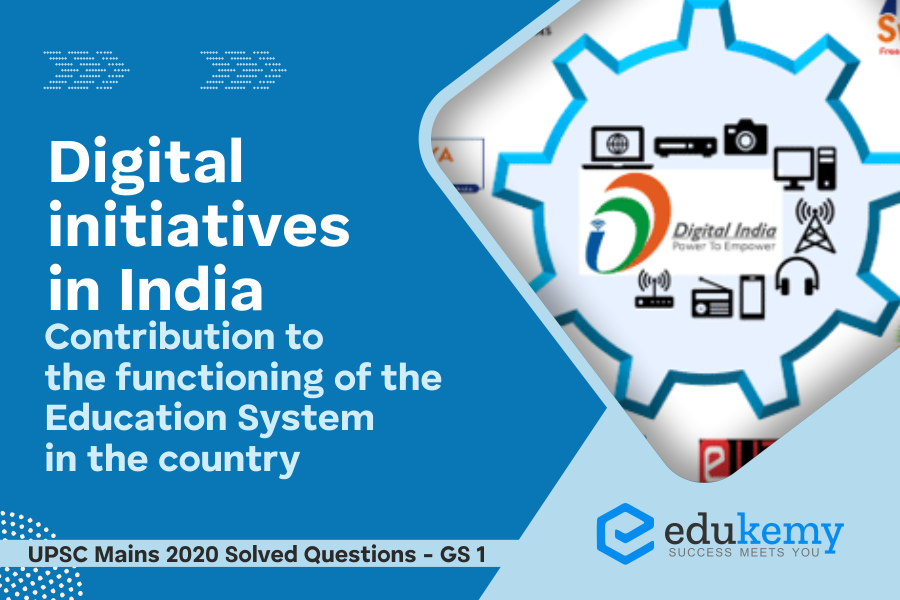
Digital initiatives in India have played a pivotal role in transforming the landscape of the education system, fostering accessibility, inclusivity, and efficiency. The introduction of various technological tools and platforms has significantly enhanced the dissemination of educational content, especially in remote and underserved areas. Initiatives such as the Digital India campaign and the National Digital Literacy Mission have facilitated the integration of digital technologies into classrooms, making learning more interactive and engaging. Online learning platforms, e-books, and educational apps have become instrumental in providing students with a wealth of resources beyond traditional textbooks. Additionally, initiatives like SWAYAM (Study Webs of Active Learning for Young Aspiring Minds) and virtual classrooms have democratized education by enabling students to access high-quality courses and lectures from top institutions, irrespective of their geographical location. Moreover, digital assessments and e-governance tools have streamlined administrative processes, contributing to the overall efficiency of the education system. These digital strides reflect a commitment to leveraging technology for the democratization of education and the empowerment of students across the diverse socio-economic spectrum in India.
UPSC Mains General Studies Paper – 1 Mains 2020
Developmental Issues
UPSC Mains Civil Services IAS Exam Question Paper – 2020
Contents
- 1 Structure of the Question
- 2 Answer
- 3 Conclusion
- 4 Frequently Asked Questions (FAQs)
- 4.1 Q: How have digital initiatives in India transformed the traditional education system?
- 4.2 Q: What role do government-led digital initiatives play in enhancing educational accessibility across India?
- 4.3 Q: How have digital initiatives facilitated the transition to online learning during the COVID-19 pandemic?
- 4.4 Q: In what ways have digital initiatives contributed to personalized learning and skill development in the Indian education system?
- 4.5 Q: How do digital initiatives support teacher training and professional development in the Indian education sector?
- 5 In case you still have your doubts, contact us on 9811333901.
Structure of the Question
- In Introduction,
- Try to show digitalization in education, its importance, and steps taken to foster that.
- In Body,
- Mention some digital schemes by GOI in the education sector, their impact, and aims.
- Elaborate impediments to achieve the aim behind digital schemes.
- Conclude by showing the significance of the digital initiatives.
Answer
Introduction
The COVID-19 pandemic has dragged the traditional model of education (school, college, classroom model) into the crisis. In this situation, online education has come to the rescue of the cause of education. Moreover, even before the pandemic, digital initiatives have helped to promote inclusivity in education. However, there are several challenges of online education that need to be fixed.
Some of the initiatives in terms of school education are as follows
SWAYAM:
The ‘Study Webs of Active Learning for Young Aspiring Minds (SWAYAM) is an integrated platform for offering online courses and covering school (9th to 12th) to Postgraduate Level.
SWAYAM Prabha:
SWAYAM Prabha is an initiative to provide 32 High-Quality Educational Channels through DTH (Direct to Home) across the length and breadth of the country on a 24/7 basis. It has curriculum-based course content covering diverse disciplines.
National Digital Library (NDL):
The National Digital Library of India (NDL) is a project to develop a framework of a virtual repository of learning resources with a single-window search facility. There are more than 3 crore digital resources available through the NDL. The contents cover almost all major domains of education and all major levels of learners including life-long learners.
Challenges that are becoming obstacle to fulfill the intent behind Digital schemes in the Education sector
- According to the ASER report, In the time of the pandemic, there are serious issues related to, access, devices, content, curation, teachers, training, testing, exams, grades, funding, facilities, salaries, parents, and fees. It is estimated that only about 25 percent of Indian households have an internet facility.
- The financial model for education is falling apart everywhere during this pandemic. In India, the situation is even more complex because of the lack of a proper policy on digital education, infrastructure, and multiple languages.
- Uninterrupted broadband connectivity is minimal: According to National Sample Survey data for 2017-18, only 42 percent of urban and 15 percent of rural households had internet access, and only 34 percent of urban and 11 percent of rural persons had used the internet in the past 30 days.
- Another challenge is to keep thousands of children out of school when their parents return to their workspaces post-lockdown.
Conclusion
Digital education is very useful yet not completely successful in India. Hence, there is still a lot to do in terms of checking if students’ entitlements are not being compromised or providing meaningful academic curriculum alternatives. The transition to set up smart classrooms in all the classes is happening gradually.
Digital India and the National ICT policy have the potential to develop a knowledgeable, digital ecosystem in the education sector. It will play a key role in improving the Digital Divide in the country and integrating the education sector.
Frequently Asked Questions (FAQs)
Q: How have digital initiatives in India transformed the traditional education system?
Digital initiatives in India have revolutionized the education system by introducing online learning platforms, interactive e-books, and virtual classrooms. These tools have made education more accessible, allowing students to learn at their own pace and from the comfort of their homes.
Q: What role do government-led digital initiatives play in enhancing educational accessibility across India?
Government-led initiatives such as Digital India and BharatNet have played a crucial role in bridging the digital divide and providing internet access to remote areas. This has empowered students in rural and underserved regions to access educational resources, participate in online classes, and stay connected with the evolving curriculum.
Q: How have digital initiatives facilitated the transition to online learning during the COVID-19 pandemic?
The COVID-19 pandemic prompted a rapid shift to online education. Digital initiatives in India, such as the National Education Policy (NEP) and e-learning platforms, have played a pivotal role in ensuring continuity of education. These initiatives have enabled schools and universities to conduct virtual classes, assessments, and examinations, minimizing the disruption caused by the pandemic.
Q: In what ways have digital initiatives contributed to personalized learning and skill development in the Indian education system?
Digital initiatives have facilitated personalized learning experiences through adaptive learning technologies and tailored educational content. This approach caters to individual learning styles and allows students to focus on areas where they need improvement. Additionally, online courses and skill development programs have become more prevalent, contributing to the enhancement of practical skills aligned with industry requirements.
Q: How do digital initiatives support teacher training and professional development in the Indian education sector?
Digital initiatives have not only impacted students but have also played a significant role in teacher training and professional development. Online training modules, webinars, and virtual workshops have become commonplace, providing educators with opportunities to enhance their teaching skills, stay updated on new pedagogical approaches, and adapt to the evolving educational landscape. This contributes to the overall improvement of the quality of education in the country.
In case you still have your doubts, contact us on 9811333901.
For UPSC Prelims Resources, Click here
For Daily Updates and Study Material:
Join our Telegram Channel – Edukemy for IAS
- 1. Learn through Videos – here
- 2. Be Exam Ready by Practicing Daily MCQs – here
- 3. Daily Newsletter – Get all your Current Affairs Covered – here
- 4. Mains Answer Writing Practice – here


